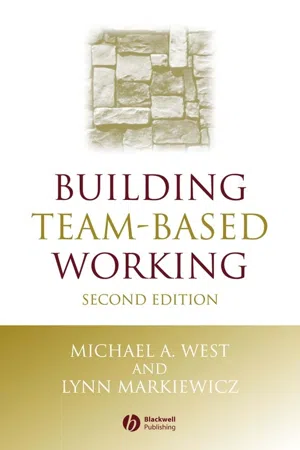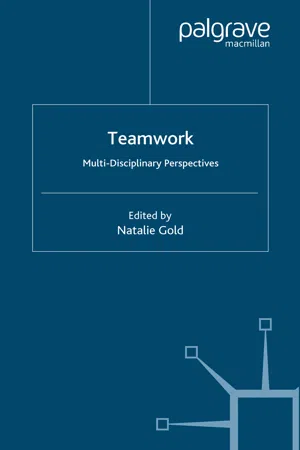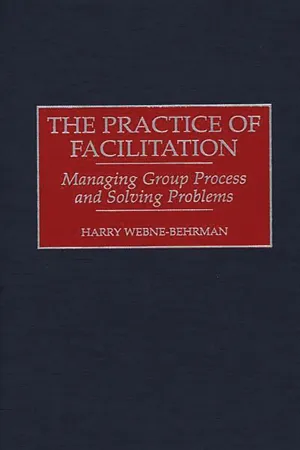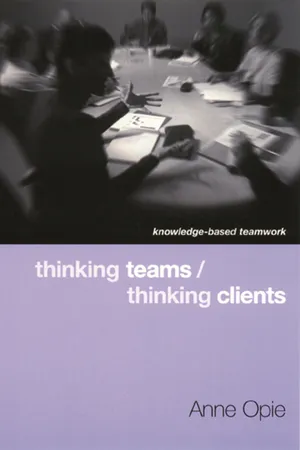Business
Effective Teamwork
Effective teamwork involves collaboration, communication, and synergy among team members to achieve common goals. It requires clear roles and responsibilities, mutual trust, and respect. Successful teamwork fosters innovation, productivity, and a positive work environment, ultimately leading to improved business performance.
Written by Perlego with AI-assistance
Related key terms
1 of 5
8 Key excerpts on "Effective Teamwork"
- Surbhi Jain(Author)
- 2019(Publication Date)
- Society Publishing(Publisher)
Every person must play their role as per the expectations and share ideas or consult other team members so that their levels of productivity are enhanced. Teamwork is important for several reasons. The first one is that it improves success in an organization. Second, it promotes creativity since different ideas are shared by the team. Third, it builds the synergy required to accomplish goals in an organization. Fourth, it helps solve problems. Fifth, it minimizes tensions in a working environment. Sixth, it enables people and organizations to respond to the changes in the external and internal environment. Spence, Kirby, and Macmillan (2001) clarify that effective teams lead to improvement in the attitudes, motivations, and personal satisfaction of the participants. They have better clarity as for their share ideas in a discussion. The resources in the firm will also be used with efficiency in mind. Time, for instance, can be used well since the tasks are handled within a short time. The participants are likely to remain optimistic since they realize that hard tasks can be handled through teamwork and discussions. The features of an effective team are demonstrated in the figure below: Learning and Development through Teamwork 193 Figure 8.1: Teamwork. Source: Slide Model, (2018). Teamwork spider web chart PowerPoint tem-plates . Retrieved from https://slidemodel.com/templates/teamwork-power-point-slides-design/teamwork-spider-web-chart-powerpoint-templates/ Sharma, Kansal, and Paliwal (2012) indicate that teams are formed for a number of reasons. The first one is the element of collaborative motivation. Human beings will often feel the need to help and care for other people. They want to feel as though they are a part of a group. It is also known as extension motivation, where people have an urge to extend the self to be of service to other people.- eBook - PDF
Building Team-Based Working
A Practical Guide to Organizational Transformation
- Michael A. West, Lynn Markiewicz(Authors)
- 2008(Publication Date)
- Wiley-Blackwell(Publisher)
106 DEVELOPING EFFECTIVE TEAMS reward the achievement of objectives in appropriate relation to the importance of their achievement to the team as a whole; provide support if required in prioritizing goals, developing action plans and managing time. A well-used approach to setting objectives for both individual team members and the team as a whole is the use of SMART dimensions: • Specific • Measurable • Appropriate • Realistic • Time-bound. Even more instructive is what the research evidence from psychological studies of goal setting and motivation indicate. Goals should be clear, they should also be challenging and team members responsible for achieving them should be involved in setting them. Finally, team members should feel a sense of efficacy about their ability as a team to achieve these goals. In these circumstances, goals are likely to be maximally motivating and the team maximally effective. 5.2 Team Participation The point of teamwork is to bring together people with different skills, experiences and knowledge to work interdependently to accomplish a task that is best done by such a group rather than by individuals working alone or in parallel. So building effective teams means ensuring a high and appropriate level of participa-tion. This requires that they interact, share information and also influence the decisions that are made. We next examine what this means and how it can be enabled. Interaction In order for a group of individuals who share a common goal to be called a team they must have some minimal ongoing interac-tion, otherwise their efforts are essentially uncoordinated and unaggregated. Teams interact during task performance and in-formally; both are equally important. Informal interactions might DEVELOPING EFFECTIVE TEAMS 107 include parties, lunches or informal chats in the corridors to discuss family matters or sporting events. - eBook - PDF
Teamwork
Multi-Disciplinary Perspectives
- N. Gold(Author)
- 2004(Publication Date)
- Palgrave Macmillan(Publisher)
6 The Psychology of Effective Teamworking Carol S. Borrill and Michael A. West Teams have become the building blocks of organizations (Lawler, Mohrman and Ledford, 1992). As organizations grow in size and become structurally more complex, groups of people are needed who work together in co- ordinated ways to achieve objectives that contribute to the overall aims, effectiveness and competitiveness of the organization. Team working pro- vides the flexibility needed to respond effectively, appropriately and more quickly than competitors to the constantly changing demands in the organ- ization’s environment, and provides a mechanism for bringing together the range of expertise, skills and knowledge required to complete complex work tasks. The contribution that team working makes to organizational effective- ness has been demonstrated in a range of studies. A review by Weldon and Weingart (1993) revealed that the introduction of groups with shared goals lead to better performance and productivity in a variety of organizational settings. Macy and Izumi (1993) conducted a meta-analysis of 131 field studies of organizational change and found that interventions with the largest effects upon financial measures of organizational performance were team development interventions or the creation of autonomous work groups. Applebaum and Batt (1994) reviewed 12 large-scale surveys and 185 case studies of managerial practices. They concluded that team-based working leads to improvements in organizational performance on measures both of efficiency and quality. Similarly, Levine and D’Andrea-Tyson (1990) concluded that substantive participation leads to sustained increases in productivity and that teams effectively enable such participation. Cotton (1993) confirmed this finding in a study of a variety of forms of employee involvement. - eBook - PDF
The Practice of Facilitation
Managing Group Process and Solving Problems
- Harry M. Webne-Behrman(Author)
- 1998(Publication Date)
- Praeger(Publisher)
2. Utilization of Resources—Through an affirming environment, members are encouraged to share their insights, talents, and skills. Differing work styles are brought out and blended, rather than ridiculed. Members are encouraged to know one another beyond their formal roles, potentially bringing other talents to the team's activities. 3. Trust and Mutual Respect—Team members demonstrate respect for one another and trust each other within the context of their work. They can count on each other for support, follow through on promises, and deal directly with each other in expressing concerns. 4. Conflict Resolution—The team brings forward matters of conflict as a normal function of its development. In managing conflicts, members negotiate credible and durable solutions. Issues of concern are regarded with respect, including emotional concerns that may be crucial to unlocking other issues. 5. Shared Leadership—Effective participation by all members in leading various tasks and assignments fosters a broad sense of ownership for team goals. There are numerous opportunities for growth, both personal and professional, that encourage risk taking. Members feel they are doing meaningful work, rather than merely serving to rubber stamp the decisions of others. 6. Control and Procedures—Members of effective teams clearly understand the purpose of their meetings. Agendas, schedules, and other procedures are developed in a prescribed manner, with shared authority for creating them. The facilitator role, whether internal or external, promotes democratic participation in meetings, even in hierarchal organizations. Facilitating Team Development 127 7. Effective Interpersonal Communication—Communication is valued and supported throughout the team, not merely along the formal chain of command. Members practice active listening, assertive communication, and collaborative problem solving, fostering openness about issues facing the group. - eBook - PDF
Moving from Project Management to Project Leadership
A Practical Guide to Leading Groups
- R. Camper Bull(Author)
- 2010(Publication Date)
- CRC Press(Publisher)
When employees see their leaders working through uncomfortable issues and overcoming personal differences for the greater good of the firm, they’ll feel more comfortable and secure with the idea of engaging in constructive conflict with one another—and make no mistake, conflict is an essential component of real teamwork. In the next chapter, we’ll outline specific team-building techniques designed to facilitate true teamwork. Understanding Teamwork 37 Chapter 3 Review The work “teamwork” is extremely overused in modern organizations and corporations. A “team” is frequently defined as any group of people gathered to work on a specific task or activity; however, not every team is capable of teamwork. In fact, not every group of people assembled to work together on a project can be defined as a team. As the world’s economy globalizes, creat-ing a flat playing field for companies, finding the competitive edge becomes increasingly difficult. However, developing a superior team that is capable of true teamwork is one of the most powerful ways for an organization to develop a strategic differentiator over the competition. Organizations unintentionally hinder teamwork in many ways: Assigning groups of people to work on an assignment together and • expecting teamwork to occur magically Not allowing the team ample time to get to know each other and • develop rapport Frequently reorganizing or shifting teams before they’ve had the • opportunity to achieve true teamwork Allowing office politics to interfere with the highest levels of leader-• ship within the organization Members of a true team, also known as a “high-performing team,” must understand how the other team members work and think, how team mem-bers can contribute to the project workload, and how to support and encour-age the other teammates. High-performing teams are created when every aspect of the team triangle has been developed in equal measure. - No longer available |Learn more
Leadership
Research Findings, Practice, and Skills
- Andrew DuBrin(Author)
- 2018(Publication Date)
- Cengage Learning EMEA(Publisher)
SUMMARY Developing teamwork is a key leadership role. Team-work is an understanding of and commitment to group goals on the part of all group members. Leaders still play an important role in a team-based organization, such as being expert in the team process, being facilitators, building trust and inspiring team-work, and enabling and empowering group members to accomplish their work. The enabling role centers on empowerment. It is important for top-level leaders to build a shared collective identity among the teams reporting to them. The external leader of a self-managing team plays a key role when the team faces disruptive conditions. A wide range of leader actions fosters teamwork. Measures leaders can take using their own resources include the following: (1) defining the team’s mission and tasks; (2) establishing a climate of trust; (3) devel-oping a norm of teamwork based on cooperation theory; (4) developing group emotional intelligence; (5) emphasizing pride in being outstanding; (6) serving as a model of teamwork, including power sharing and collective leadership; (7) using a consensus leadership style; (8) establishing urgency, demanding performance standards, and providing direction; (9) encourag-ing competition with another group; (10) engaging in ample interaction with the team and providing posi-tive feedback; (11) minimizing micromanagement; and (12) practicing e-leadership for virtual teams. Techniques to foster teamwork that require rely-ing on organization structure or policy include the team 226 teamwork 226 cooperation theory 230 micromanagement 234 e-leadership 234 open-book management 238 leader–member exchange (LMX) model 241 KEY TERMS Copyright 2019 Cengage Learning. All Rights Reserved. May not be copied, scanned, or duplicated, in whole or in part. Due to electronic rights, some third party content may be suppressed from the eBook and/or eChapter(s). - eBook - PDF
- Anne Opie(Author)
- 2001(Publication Date)
- Columbia University Press(Publisher)
The major rationale for teamwork is that teams produce more effective work; at the same time there is a substantial absence of discussion based on close analysis of transcripts of team reviews about the shape and features of this supposedly effective work. The analysis produced here is not intended to result in a prescriptive list of conditions or factors against which the effectiveness of teams can be universally and authoritatively measured. Teamwork is a dynamic outcome of the intersection of professional and organizational discourses and objectives, the range of disciplines represent-ed in a team, the organizational settings in which members work, and the team itself. Precisely how these extremely complex elements intersect will vary in relation to different geographical, cultural, and legal spaces, and within those spaces teamwork is also played out in the context of organiza-tional and practice cultures. A team in the United States operates in differ-ent legal and cultural environments than does a team in Aotearoa/New Zealand and, as some members in the study emphasized, such environ-ments inform very different assumptions about interprofessional relation-ships, authority, and team practices. The objective of part 2 is to engage with the concept of effectiveness, placing it against analyses of members’ transcripts, team discussions (including sequential discussions of two clients running over several weeks), and family meetings in order to pro-vide points of reference against which teams can review elements of their performance. In chapters 5 and 6 I have quoted from a number of interviews with various team members. I have not identified the speakers of these quotes Displaying Teamwork Part Two nor their sites because none of them had raised the critiques they devel-oped in the course of our interview with their teams, and identifying their profession and/or site could mean that they would be identifiable by knowledgeable local readers. - eBook - PDF
The Daily Art of Management
A Hands-On Guide to Effective Leadership and Communication
- Peg Thoms, James F. Fairbank(Authors)
- 2008(Publication Date)
- Praeger(Publisher)
If we start working together during any of those gatherings, we might become a team—and perhaps just for that brief time. Generally, the goal of a group is to share information; the goal of a team is collective performance. Groups allow for individual accountability; teams require mutual accountability. The skill set of people in groups might be random and varied; the skills of team members are usually either the same or, often times, complementary. Bringing It All Together through Teamwork 153 Because organizations prefer to use the word teams almost exclu- sively, we will follow that convention in this chapter. Groups tend to form naturally and informally, because human beings are social creatures. Groups provide us with strength in numbers and security, they provide us with mutual support both physically and emotionally, and they help us protect our identities or other facets of our being that are important to us. Professional organizations are good examples of groups. Teams, on the other hand, are usually carefully constructed and managed to get the most from peoples’ respective capabilities, and are designed to achieve synergy. WHAT IS ALL THIS TALK ABOUT SYNERGY? Synergy is one of those words that is tossed around pretty indis- criminately these days, as if it were magic dust. Synergy essentially boils down to the equation 1 + 1 + 1 = 4. What that means is that if three of us were to work individually and put our effort together, and each of us had a productive output of 1, then we would expect our productive output together to equal our additive individual efforts, or 3. However, if by working together, sharing information, and incorporating that additional information in our collective thought process, we achieve something more than our additive out- put; hence, 4. To illustrate synergy, just look at successful profes- sional sports teams. All professional athletes possess superb talents, and the individual performance differences between teams are slight.
Index pages curate the most relevant extracts from our library of academic textbooks. They’ve been created using an in-house natural language model (NLM), each adding context and meaning to key research topics.







